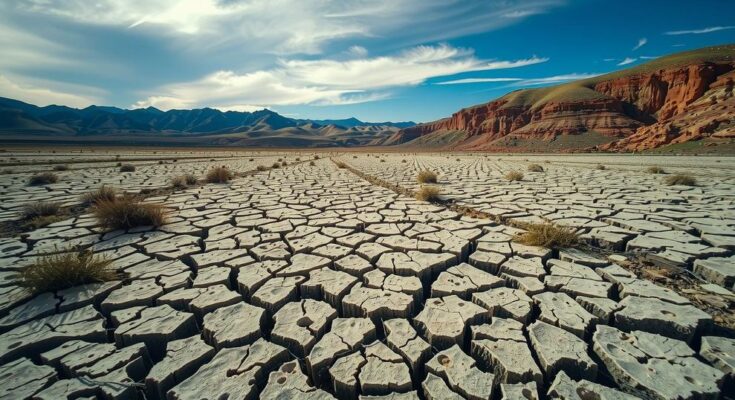A study predicts that Colorado may face extreme droughts every six years by the end of the century due to climate change. The last major drought, from 2020 to 2022, showcased the devastating impacts of rising temperatures, which accounted for the majority of drought severity. Experts stress the urgency for reducing greenhouse gas emissions to address this escalating crisis effectively.
A recent study indicates that Colorado and the broader western United States may face extreme droughts every six years by the century’s end, driven by ongoing climate change and rising global temperatures. Historically, severe drought conditions occurred less frequently, but evidence shows that warmer climate patterns have significantly increased both the frequency and intensity of these droughts. With the last major drought occurring from 2020 to 2022, researchers have drawn a direct correlation between rising temperatures and drought severity, holding higher temperatures responsible for 61% of the drought’s impact.
The study led by scientists from the University of Colorado Boulder highlights that future droughts are expected to last longer and affect larger areas. Joel Lisonbee, a researcher, emphasized that the droughts would be increasingly severe. The implications of these conditions extend beyond merely dry landscapes; they have already enabled some of the largest wildfires in Colorado’s history, causing widespread environmental destruction, including significant mudslides and flash floods.
Moreover, research published in Science Advances underscores the relationship between warming temperatures and increased water vapor in the atmosphere, leading to heightened evaporation and diminished precipitation. This scenario creates a harmful feedback loop that exacerbates drought conditions, suggesting that traditional measures like reservoir construction can no longer serve as adequate solutions. As noted by Rong Fu, a UCLA atmospheric sciences professor, “The only way to prevent this is to stop temperature increases, which means reducing greenhouse gas emissions.”
The recent drought has prompted state-level emergency declarations, revealing the immediate need for Colorado to address potential future crisis scenarios if decisive action is not taken. The state risks ongoing challenges related to water scarcity, agricultural productivity, and broader community impacts without significant mitigation strategies implemented soon.
The topic of climate change remains a critical global issue, particularly concerning its effects on precipitation patterns and water resources. In regions such as Colorado, historical climate data indicates that severe droughts were rare. However, evidence now suggests that as the planet warms, the likelihood of increasingly frequent and severe droughts rises. This not only threatens local ecosystems and agriculture but also amplifies risks associated with wildfires and air quality. The ongoing discourse emphasizes the necessity for immediate and impactful actions to curb greenhouse gas emissions to mitigate these adverse climate effects.
In summary, Colorado is at risk of experiencing extreme droughts every six years if global temperatures continue to rise, which has serious implications for its water resources, agriculture, and overall community resilience. Historical trends have shifted, leading to more severe drought conditions, exemplified by the recent 2020-2022 drought. Experts assert that immediate action to reduce greenhouse gas emissions is crucial to avert these increasingly severe weather patterns, highlighting the urgency of addressing climate change now.
Original Source: www.natureworldnews.com




